
The quality of your product depends heavily on the integrity of its seal. Why? Because inconsistent or improperly sealed products can leak or be easily contaminated, leading to disappointed and dissatisfied customers.
Despite the importance of having secure closures, many manufacturers continue to rely on manual or outdated sealing methods, which can lead to slower production times, higher error rates, and increased product damage during transit.
The solution? Automated packaging equipment. Capping machines automate the sealing process, delivering speed, precision, and reliability to production lines. By integrating a bottle capping machine into your packaging operations, you can streamline production, reduce waste, and maintain product integrity—all while enhancing customer satisfaction.
Let’s explore why precision in sealing matters and how you can successfully integrate one into your production line.
How Precise Sealing Protects Products, Customers, and Your Brand
Achieving a secure and accurate seal isn’t just about appearance—it’s about preserving product quality and protecting brand reputation. A reliable bottle capping machine ensures that every product is sealed to the same standard, preventing costly issues like leakage, contamination, and product recalls.
Here’s why precision matters in the sealing process:
Protect Product Integrity
A well-sealed container protects its contents from external contaminants like dust, moisture, and bacteria. This is particularly important in industries like food and beverage, pharmaceuticals, and cosmetics, where product integrity directly impacts safety and customer health. Cappers apply consistent pressure and torque, ensuring airtight seals that help extend shelf life and keep the product fresh.
Boost Customer Satisfaction
Nothing frustrates customers more than receiving leaking, damaged, or spoiled products. A consistent, reliable seal ensures that products arrive in pristine condition, enhancing customer satisfaction and boosting brand loyalty. Leak-free packaging also creates a positive unboxing experience, which can generate better reviews and increase word-of-mouth referrals.
Meet Packaging Regulations
In many industries, accurate sealing is a regulatory requirement. For instance, FDA guidelines for food and pharmaceuticals mandate secure, tamper-evident packaging to ensure consumer safety. Cappers help businesses meet these standards by applying consistent, verifiable seals that comply with industry-specific packaging regulations.
Switching from manual capping methods to automated capping machines offers significant operational advantages. Here are some of the key benefits of incorporating cappers into your automated packaging equipment:
1. Seal More in Less Time
Manual capping is time-consuming and labor-intensive. Capping machines automate the sealing process, dramatically increasing production speeds without sacrificing accuracy. With the right equipment, businesses can scale production to meet growing demand without adding excessive labor costs.
2. Say Goodbye to Inconsistent Seals
Manual capping introduces inconsistencies—some caps may be too loose, too tight, or unevenly applied. Cappers are designed to apply uniform torque and pressure, ensuring every container is sealed correctly, regardless of batch size. This reduces the risk of product defects and ensures consistent quality.
3. Reduce Product Loss
Improper sealing can lead to product loss, spills, and packaging material waste. Cappers reduce these issues by applying precise seals every time, minimizing the risk of damaged goods and costly rework. Over time, this waste reduction contributes to increased profitability.
4. Cut Costs and Improve Efficiency
While manual capping may seem more economical initially, long-term costs from errors, waste, and labor inefficiencies can quickly add up. Capping machines optimize operational efficiency by lowering labor requirements, reducing product loss, and increasing throughput, resulting in significant cost savings over time.
Capping Machines 101: Types, Applications, and Best Uses
To choose the right capping machine, you must understand the different types available and their applications across industries.
Automatic vs. Semi-Automatic Cappers
Semi-Automatic Capping Machine: These cappers require some manual input but offer more flexibility for businesses with smaller production runs. They’re cost-effective and easy to use, making them ideal for businesses transitioning from manual to automated processes.
Automatic Capping Machine: Fully automated systems that integrate into high-speed production lines, applying seals with minimal human intervention. Ideal for large-scale manufacturers with high production volumes.
Top Industries That Rely on Capping Machines
Capping machines are crucial to ensure products are securely sealed, protected, and ready for the market. These cappers offer the precision and efficiency needed to maintain product quality and meet industry regulations.
Here are some of the key industries that benefit from reliable capping solutions:
- Food & Beverage: For sealing bottles of water, juices, sauces, and condiments.
- Pharmaceuticals: For securing pill bottles, syrups, and liquid medications.
- Cosmetics: For applying caps to bottles of lotions, shampoos, and other personal care products.
Capping Machines for All Packaging Needs

Bottle capping machines can be adjusted to apply various cap styles depending on product and industry requirements.
- Screw Caps: For beverages, sauces, and pharmaceuticals that require tight, tamper-proof seals.
- Snap Caps: Commonly used for personal care products like lotions and gels.
- Tamper-Evident Caps: Essential for food, beverage, and pharmaceutical products to provide visible proof of product integrity.
- Child-Resistant Closures: Crucial for medications and household chemicals to protect young children while ensuring accessibility for adults.
By investing in a versatile capping machine, manufacturers can adapt to changing packaging needs and introduce new products without investing in additional automated packaging equipment.
4 Steps to Easily Integrate Cappers Into Your Production Line
Incorporating a bottle capping machine into your production line doesn’t have to be complicated. Here are four key considerations for a smooth integration:
- Assess Production Needs: Identify your production volume, container types, and cap styles to select the most suitable capper.
- Ensure Compatibility: Confirm that the capper aligns with your existing equipment, such as fillers, labelers, and conveyors.
- Train Your Team: While cappers are designed for easy use, training your employees ensures consistent performance and proper maintenance.
- Plan for Maintenance: Regular maintenance maximizes uptime and prevents costly breakdowns. Investing in a spare parts kit can reduce unplanned downtime.
Optimize Your Packaging Process With the CP-10
Reliable automated packaging equipment is an investment in product quality, operational efficiency, and brand reputation. Our CP-10 Semi-Automatic Capping Machine offers a flexible, efficient solution for businesses seeking precise and reliable capping without the complexity of fully automated systems.
Easily adjustable at every stage of the process, the CP-10 allows you to customize operations to fit your specific product requirements. Whether you're handling different cap sizes, materials, or container types, the intuitive controls make switching between products seamless, minimizing downtime and maximizing productivity. If you’re ready to optimize your packaging process and deliver consistently sealed products, the CP-10 is designed to meet your unique production needs.
Discover if the CP-10 is the right capping machine for your production line by talking to one of our experts. Schedule a free equipment consultation today!
.webp?width=200&height=135&name=2x-Packleader-logo-large%20(1).webp)

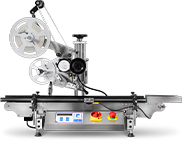
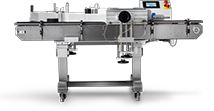
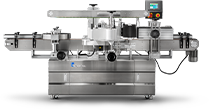
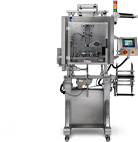
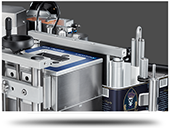
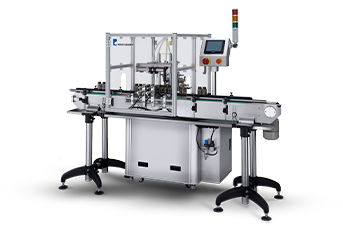
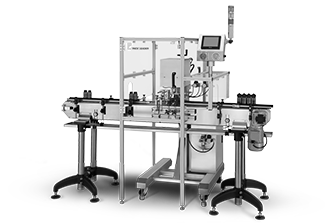
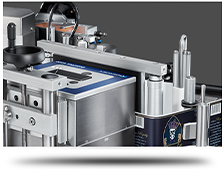






.webp?width=360&name=2x-color-logo%20(1).webp)